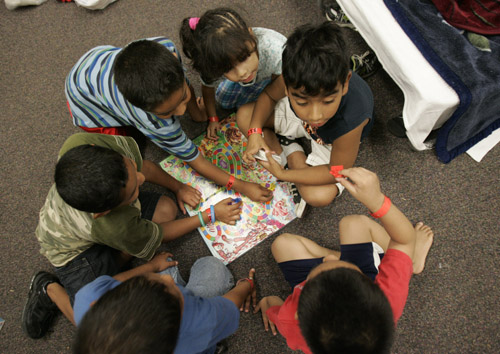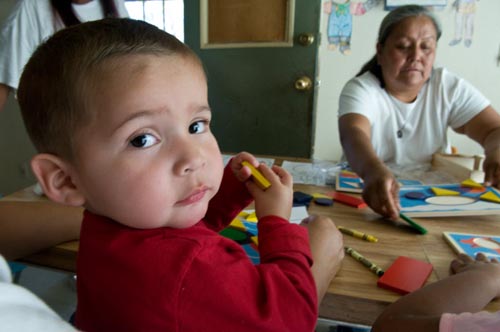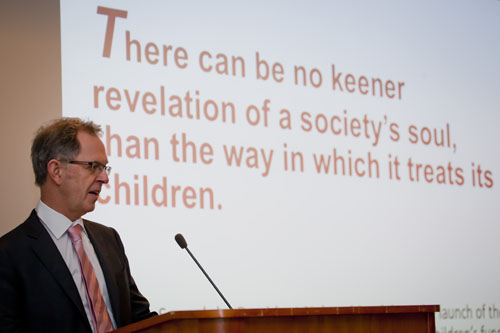
Even with food stamps, 窮人還是窮人. 經合組織列出了美國. 是兒童貧困率最高的五個經合組織國家之一. The impact of poverty is significant in the outcomes of children in America’s education system. According to the National Center for Children in Poverty, 大約 22 percent of U.S. children less than 6 歲, 和 18 percent of children between the ages of 6 和 17, 簞食瓢飲.
So what should we be doing to support the approximate 20 percent of U.S. school children who live in poverty?
從 1991 對 1993, Diane Ravitch was Assistant Secretary of Education in the administration of President George H.W. 襯套.
從 1997 對 2004, she was a member of the National Assessment Governing Board, which oversees the National Assessment of Educational Progress, the federal testing program. Ravitch is the author of numerous books on education, 其中 美國大學校系統的死與生: 如何測試和選擇,是破壞教育.
How do you find a great teacher for a poor school where the best teachers are probably needed most?
今天, the definition of a great teacher seems to be somebody who can get test scores up. But that is not necessarily a great teacher. A great teacher is one who inspires students, one who encourages them to love learning. Test scores do not measure that. A person who can get the test scores up is sometimes a terrible teacher. Someone who spends hours and hours drilling children mindlessly and making them take practice test after practice test is not a good teacher.
Great teachers are made, not born. The first requisite for great teachers for poor schools is to find teachers who want to make a difference in the lives of poor children. Many teachers want to teach in poor neighborhoods and prepare themselves to do so. I have met many teachers-in-training who feel a strong sense of mission. They know that they need extra preparation so that they are prepared for all the different issues they will encounter. Great teachers emerge from experience over time. Great teachers can be nurtured by great principals. There is no simple formula for cranking out “great teachers.” Those who are in charge of a school district must have the wisdom to identify and support the leadership — the principals, who will support and nurture their teachers.
People argue if you exclude the schools with a significant number of poor children then the performance of American students on PISA tests would be in the top ten countries.
That is correct. Our PISA results reflect the poor scores achieved by students living in poverty. Among OECD nations, only Mexico, Turkey and Poland have a greater proportion of children in poverty.
How should we improve our poor schools — send in the best teachers?
I do not think that sending our best teachers to the poorest schools would make much of a difference. The working conditions are so bad in some of these schools that even the best of teachers will be unable to help. You first have to want to improve the schools, not close them. American policy right now is focused on closing schools, 即. fire the principal, fire the staff and start all over again. It’s a very discouraging situation because it is not as if there are thousands of fabulous teachers waiting in line to take a job in the schools that have been built on the ashes of the old school. So first of all, there has to be a determination to say that we are going to improve performance at these schools and we’re going to have a broader set of measures than standardized tests. If you’ve got children who can’t read English, they are not going to get high test scores. If you’ve got children who are autistic, they are still going to be autistic next year. We must deal with the problems that children have and help them to learn, 無論, and not use the test scores to stigmatize them or their teachers.

50 percent of our new teachers leave the profession within 5 歲月. What are your thoughts on how to solve the problems?
If we had started trying to fix our problems 25 幾年前, we would now be in a different position. We need to do what they did in Finland. We need to change the approach to recruitment, 支持, and retention of teachers. We should begin by raising standards for entry into teaching. Teachers should have at least a year devoted to post-graduate study and practice. New teachers need the support of a mentor. Then we have to focus on retention. Salaries should be higher. While there is much talk about reform, teachers are seeing pay cuts, including cuts in their healthcare. I hear from teachers all the time who tell me they spend $1,000-2000 per year out of their own money buying supplies for their students. The average teachers’ salary in the U.S. is about U.S.$50,000 per year. This is a profession that is not well paid and that is constantly under attack. It’s a wasteful system where 50 percent of the people who enter the profession are gone within five years. We have a system now for recruiting people into teaching in which the standards get lower and lower.
Teach for America has raised U.S. $500,000,000 in the last decade. They have become the focus of philanthropy and government investment. They offer college graduates a five week summer training program and then they are placed in the classroom as a teacher. They agree to stay for only two years. Many of these graduates are also sent into very difficult schools. When I told Finnish educators that we have teachers with five weeks of teacher training, their eyes just popped. There are some states where there is no requirement for becoming a teacher other than having a college degree. In other states, teacher training is done online. We have a recruitment system that does not work, a support system that does not work, and no system to retain teachers.
Are we allocating education monies in the wrong places?
We are spending way too much on accountability right now. 此外, a very large percentage of what we do spend goes into special education, which is necessary of course. Other countries find better ways to categorize the funding. I do not think we are spending more than other countries. I think we are just allocating our monies differently. I think we should be spending more money on high quality pre-school education. 成績差距不是由學校造成的. The achievement gap begins before the children are born. The parents are poor. They have no education. We see the results in every testing program. Kids who come from these poor communities do badly compared to kids who come from the other end of the spectrum. Those who live in affluent families begin life with great advantages.
What other work has to be done to support children’s schools in poor communities?
The first thing I would do would be to make sure the schools are in excellent physical condition. The condition of a school sends a message to a child. Many children are attending schools that are old and decrepit. That says to a child: “You are not considered to be worthy of a beautiful school.” A beautiful facility says “This is a safe place. This is a place where you are respected.” 其次, I would want a school with teachers who are committed to teaching children and to dealing with all the social and emotional problems that poor children bring to school. Many poor children come to school hungry, many have medical issues that need to be addressed. You need teachers who are prepared for all kinds of disabilities. 接著, after the facilities are taken care of and the right teachers are in place, I would put a tremendous focus on the curriculum, especially the arts.
Successful school systems such as the one in Finland place high importance on the arts. What are we doing in America?
This is a very important topic. Many districts are cutting the arts, which is really outrageous. What I saw in Finland was that the arts are very important and center stage in every single school I visited.

黛安·拉維奇和C. M. 魯賓

在 全球搜索教育, 和我一樣,全球知名的思想領袖,包括邁克爾·巴伯爵士 (英國), 博士. 萊昂特司特因 (美國), 博士. 琳達·達林 - 哈蒙德 (美國), 博士. 馬達夫恰範 (印度), 邁克爾·富蘭教授 (加拿大), 霍華德·加德納教授 (美國), 伊馮娜赫爾曼教授 (荷蘭), 克里斯汀Helstad教授 (挪威), 玫瑰Hipkins教授 (新西蘭), 科妮莉亞Hoogland教授 (加拿大), 太太. 尚塔爾考夫曼 (比利時), 多米尼克·拉方丹教授 (比利時), 休·勞德教授 (英國), 本·萊文教授 (加拿大), 巴里McGaw教授 (澳大利亞), Ř教授. 納塔拉詹 (印度), 斯瑞達拉賈戈帕蘭 (印度), 博士. 黛安·拉維奇 (美國), 肯·羅賓遜爵士 (英國), 帕西SAHLBERG教授 (芬蘭), 安德烈亞斯·施萊歇 (PISA, 經合組織), 博士. 安東尼·塞爾頓, 博士. 大衛·謝弗 (美國), 博士. 基爾斯滕都沉浸式 (挪威), 總理斯蒂芬·SPAHN (美國), 伊夫Theze (法國公立高中美國), 查爾斯Ungerleider教授 (加拿大), 托尼·瓦格納教授 (美國), 迪倫Wiliam教授 (英國), 西奧Wubbels教授 (荷蘭), 邁克爾·楊教授 (英國), 和張民選教授 (中國) 因為他們探索所有國家今天面臨的大畫面的教育問題. 全球搜索教育社區頁面
ç. M. 魯賓是兩個廣為傳誦的在線系列,她接受了筆者 2011 厄普頓·辛克萊獎, “全球搜索教育”和“如何將我們閱讀?“她也是三本暢銷書, 其中 真正的愛麗絲夢遊仙境.





最新評論